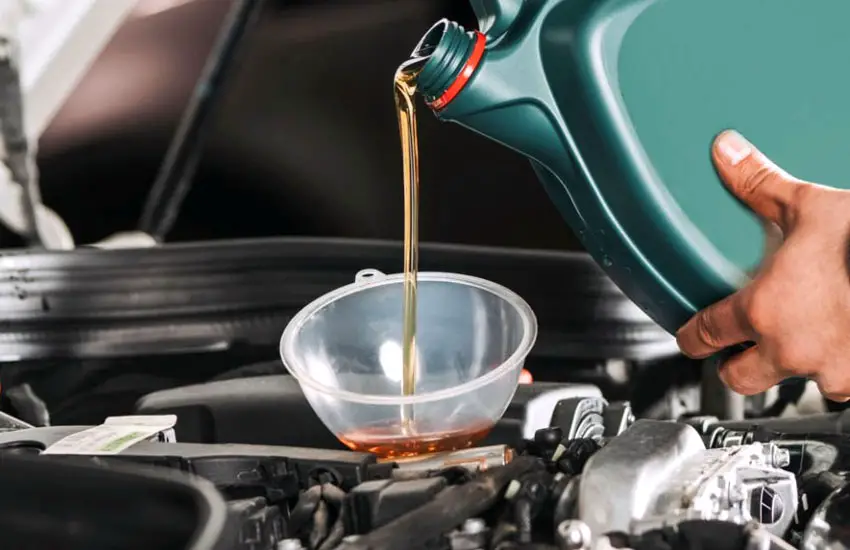As an Amazon Associate, I earn from qualifying purchases at no extra cost to you.
Can Transmission Fluid Go Bad? 5 Key Signs of Deterioration
Transmission fluid is an essential part of your vehicle’s operation. It keeps everything running smoothly, just like oil does for the engine. However, many people overlook the importance of checking and changing transmission fluid regularly. If you're asking yourself whether transmission fluid can go bad, you're not alone. Understanding how transmission fluid works and its potential issues is crucial for maintaining your car’s performance and longevity.
In this blog post, we'll explore how transmission fluid can degrade, the signs of bad transmission fluid, the effects it can have on your vehicle, and what you can do about it. So, let's dive into the world of transmission fluid and uncover the answers to your questions!
What Is Transmission Fluid?
Transmission fluid is a special type of fluid designed specifically for use in your car’s transmission. The transmission is the part of your vehicle that transfers power from the engine to the wheels. It helps to shift gears smoothly and efficiently. Without the right amount of clean transmission fluid, your car may struggle to shift gears, leading to performance issues.
There are different types of transmission fluid, including automatic and manual transmission fluids. Automatic transmission fluid (ATF) is more common and contains additives to help with lubrication and cooling. Manual transmission fluid is thicker and is designed for use in cars with manual gearboxes. Both types of fluid serve the same basic purpose: to lubricate the moving parts of the transmission and facilitate smooth gear changes.
The Importance of Transmission Fluid
Transmission fluid plays several critical roles in your vehicle. Understanding these roles helps you see why it’s so important to keep it in good condition:
- Lubrication: The moving parts inside the transmission require lubrication to reduce friction. Without adequate lubrication, parts can wear out quickly and lead to costly repairs.
- Cooling: Transmission fluid helps to dissipate heat generated by the transmission as it works. Overheating can damage transmission components and lead to a complete transmission failure.
- Hydraulic Pressure: In automatic transmissions, fluid creates hydraulic pressure that enables the transmission to shift gears. If the fluid is dirty or low, it can cause the transmission to malfunction.
- Contaminant Removal: Transmission fluid also helps to carry away dirt and debris from the transmission, preventing build-up that can cause issues over time.
In summary, keeping your transmission fluid clean and at the right level is vital for your vehicle’s overall performance and health.

How Does Transmission Fluid Go Bad?
Transmission fluid can go bad for various reasons, and understanding these causes can help you prevent issues down the road. Here are some common reasons why transmission fluid deteriorates:
1. Heat and Wear
Heat is one of the main enemies of transmission fluid. As the transmission operates, it generates a lot of heat. Over time, this heat breaks down the fluid, causing it to lose its effectiveness. When transmission fluid becomes too hot, it can start to burn, leading to a darker color and a burnt smell. This breakdown can cause the fluid to lose its ability to lubricate and cool the transmission properly.
Additionally, as the moving parts of the transmission wear down, they can shed tiny metal particles into the fluid. This contamination further degrades the fluid and can lead to clogs and other transmission issues.
2. Contamination
Transmission fluid can become contaminated by dirt, metal shavings, and other debris over time. Contaminants can enter the fluid from wear and tear on the internal components of the transmission. If the fluid is not changed regularly, these contaminants can accumulate, leading to a range of problems. For instance, they can cause clogs in the transmission filter, reducing fluid flow and cooling efficiency. Contaminated fluid can also lead to more significant wear on the transmission’s components, ultimately resulting in a breakdown.
3. Moisture
Moisture can find its way into the transmission fluid, particularly if there is a leak or a failed seal. Water in the fluid can cause corrosion and reduce the fluid’s ability to lubricate effectively. Moisture can also create a milky appearance in the fluid, which is a sign that it has become contaminated and is no longer functioning as it should.
4. Chemical Breakdown
Transmission fluid contains various additives designed to enhance its performance. Over time, these additives can break down due to heat and oxidation. When the additives are depleted, the fluid may lose its ability to protect the transmission from wear and tear, leading to increased friction and potential damage.
5. Neglecting Maintenance
One of the most common reasons transmission fluid goes bad is neglecting regular maintenance. Many vehicle owners do not think to check or change their transmission fluid until they experience a problem. However, like any other fluid in your vehicle, transmission fluid needs to be changed regularly to ensure optimal performance. Most manufacturers recommend checking and changing the fluid every 30,000 to 60,000 miles, but it can vary based on your vehicle and driving conditions. Failing to follow the recommended maintenance schedule can lead to early fluid degradation and transmission issues.
Signs of Bad Transmission Fluid
Knowing the signs of bad transmission fluid is essential for maintaining your vehicle's health. If you notice any of the following symptoms, it may be time to check your transmission fluid:
1. Strange Smells
One of the first signs of bad transmission fluid is a strange smell. If the fluid starts to burn, it can produce a burnt odor. This smell indicates that the fluid has overheated and is breaking down. Ignoring this smell can lead to severe damage to your transmission.
2. Dark or Dirty Fluid
Healthy transmission fluid is typically a bright red or pink color and has a somewhat sweet smell. If you notice that your transmission fluid appears dark brown or has a dirty, gritty texture, it's a sign that the fluid is contaminated and has likely lost its effectiveness. This discoloration may indicate that it's time for a fluid change.
3. Delayed Shifting
If you experience delays in shifting gears, it may be a sign of bad transmission fluid. This delay can occur when the fluid is too dirty or has lost its ability to create the necessary hydraulic pressure. If your vehicle hesitates when shifting from park to drive or during gear changes, it's essential to have your transmission fluid checked.
4. Slipping Gears
If your car suddenly slips out of gear while driving, it could be due to low or contaminated transmission fluid. Slipping gears can lead to dangerous driving situations and may signal that your transmission is not functioning correctly. If this happens, it's crucial to address the issue immediately.
5. Unusual Noises
If you hear whining, clunking, or grinding noises coming from your transmission, it's a sign that something is wrong. These noises can occur when the transmission fluid is low or dirty, preventing the transmission from functioning correctly. Do not ignore these sounds, as they can indicate significant problems.
6. Fluid Leaks
Seeing red or brown fluid under your vehicle can indicate a leak in the transmission system. Low fluid levels can lead to overheating and damage to the transmission. If you notice a leak, it's essential to locate the source and have it repaired promptly.
Effects of Bad Transmission Fluid
Bad transmission fluid can have serious consequences for your vehicle. Understanding these effects can help you take the necessary steps to prevent transmission issues.
1. Poor Performance
One of the most immediate effects of bad transmission fluid is poor performance. Your vehicle may struggle to shift gears, leading to a jerky or rough ride. This lack of smoothness can make driving uncomfortable and may cause additional strain on the transmission.
2. Increased Wear and Tear
When transmission fluid goes bad, it can lead to increased wear and tear on the internal components of the transmission. Without proper lubrication and cooling, gears and other parts can wear down faster than they should. This wear can lead to costly repairs and, in some cases, the need for a complete transmission replacement.
3. Overheating
Bad transmission fluid can lead to overheating, as it is no longer effective at dissipating heat. Overheating can cause severe damage to the transmission, including melting components and warping gears. If left unaddressed, overheating can lead to a complete transmission failure, leaving you with a significant repair bill.
4. Transmission Failure
Perhaps the most severe consequence of bad transmission fluid is transmission failure. If the fluid is not changed regularly or becomes contaminated, it can lead to complete transmission breakdown. This failure can leave you stranded and may require an expensive rebuild or replacement.
5. Safety Risks
Driving with bad transmission fluid can pose safety risks. If your vehicle experiences delayed shifting or slipping gears, it can be dangerous in traffic. You may not be able to accelerate or decelerate as needed, increasing the risk of accidents. It's essential to address transmission fluid issues promptly to ensure your safety on the road.
How to Maintain Your Transmission Fluid
Taking care of your transmission fluid is key to keeping your vehicle in good condition. Here are some tips for maintaining your transmission fluid:
1. Check Fluid Levels Regularly
Regularly checking your transmission fluid levels can help you catch problems before they escalate. To check your fluid, locate the dipstick (usually near the back of the engine) and follow the manufacturer's instructions. Make sure your vehicle is on level ground and that the engine is warm. If the fluid is low, you may need to add more.
2. Change the Fluid as Recommended
Most manufacturers recommend changing the transmission fluid every 30,000 to 60,000 miles. However, it's essential to check your owner's manual for specific recommendations for your vehicle. Changing the fluid at regular intervals helps to prevent contamination and keeps the fluid fresh.
3. Use the Right Fluid
Using the correct type of transmission fluid for your vehicle is crucial. Different vehicles require different types of fluid, and using the wrong one can cause damage to your transmission. Always consult your owner's manual or ask a professional to ensure you're using the right fluid.
4. Monitor for Signs of Problems
Stay alert for any signs of transmission fluid issues, such as strange smells, dark fluid, or slipping gears. If you notice any of these symptoms, have your vehicle checked by a professional as soon as possible. Catching problems early can save you time and money in repairs.
5. Have Your Transmission Serviced Regularly
In addition to changing the fluid, having your transmission serviced regularly can help maintain its health. A professional can inspect the transmission for any issues and replace filters or seals as needed. Regular maintenance can extend the life of your transmission and keep it running smoothly.
What to Do if You Suspect Bad Transmission Fluid
If you suspect that your transmission fluid is bad, it's essential to take action quickly. Here's what you should do:
1. Check the Fluid
Start by checking the fluid level and condition. Use the dipstick to assess the color, smell, and texture of the fluid. If it appears dark or has a burnt smell, it may be time for a change.
2. Look for Leaks
Inspect your vehicle for any signs of fluid leaks. If you see red or brown fluid underneath your car, it could indicate a transmission fluid leak. Finding and fixing the source of the leak is essential to prevent further damage.
3. Consult a Professional
If you're unsure about the condition of your transmission fluid or if you notice any signs of trouble, it's best to consult a professional mechanic. They can perform a thorough inspection of your transmission and fluid and recommend any necessary repairs or maintenance.
4. Change the Fluid
If the fluid is dirty or burnt, it's important to change it as soon as possible. You can do this yourself if you're comfortable with DIY maintenance, but many people prefer to have a professional handle it. A fluid change typically involves draining the old fluid, replacing the filter, and refilling with fresh fluid.
5. Follow Up with Regular Maintenance
After addressing any issues, make sure to follow up with regular maintenance to prevent future problems. Keep an eye on your transmission fluid levels and schedule changes as recommended by your vehicle's manufacturer.
I hope this post has helped you understand how transmission fluid can go bad and the importance of maintaining it properly. Regularly checking and changing your transmission fluid can help ensure your vehicle runs smoothly and lasts longer. If you notice any signs of trouble, don't hesitate to consult a professional.
Are These Questions in Your Mind?
Is it safe to drive with bad transmission fluid?
Driving with bad transmission fluid is not safe. It can lead to poor vehicle performance, increased wear on transmission components, and even complete transmission failure. If you suspect issues with your transmission fluid, it's best to address them immediately.
Can I check my transmission fluid myself?
Yes, you can check your transmission fluid yourself. Locate the dipstick under the hood, and follow the manufacturer’s instructions for checking fluid levels and condition. This is an important part of vehicle maintenance.
Do I need to change transmission fluid if it looks clean?
Even if transmission fluid looks clean, it can still break down over time. It's important to follow the manufacturer's recommended schedule for changing transmission fluid, typically every 30,000 to 60,000 miles, regardless of its appearance.
Is it normal for transmission fluid to smell?
Transmission fluid should have a slightly sweet smell. If it smells burnt or foul, it's a sign that the fluid is degraded and may need to be changed. A strange odor is a warning sign not to ignore.
Can I use any type of transmission fluid in my vehicle?
No, you cannot use any type of transmission fluid in your vehicle. Different vehicles require different types of fluid. Always check your owner's manual to ensure you're using the correct transmission fluid for your vehicle.
Is a transmission fluid flush necessary?
A transmission fluid flush is not always necessary but can be beneficial in some cases, especially if the fluid is heavily contaminated. However, it's essential to consult a professional before deciding on a flush, as it may not be suitable for all vehicles.
Can bad transmission fluid cause engine problems?
While bad transmission fluid primarily affects the transmission, it can indirectly cause engine problems. For example, if the transmission fails due to bad fluid, it can lead to stalling or difficulty in shifting, which can affect the engine’s performance.
Do I need to change my transmission filter?
Yes, changing the transmission filter is important as it helps remove debris and contaminants from the fluid. A clogged filter can restrict fluid flow and lead to transmission problems. Check your owner's manual for the recommended filter change schedule.
Is it okay to mix different brands of transmission fluid?
Mixing different brands of transmission fluid is generally not recommended. Different brands may contain different additives that can react negatively with each other. It's best to use the same brand and type of fluid specified for your vehicle.
Can I drive my car if the transmission fluid is low?
While it may be possible to drive a short distance with low transmission fluid, it is not advisable. Low fluid levels can cause overheating and damage to the transmission. If you notice low fluid, it's best to address the issue before driving any further.











